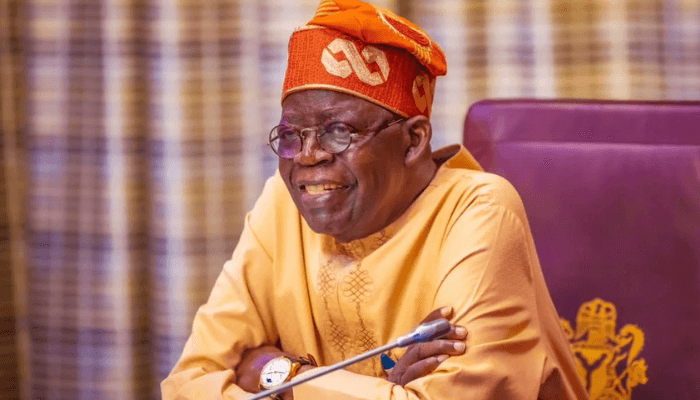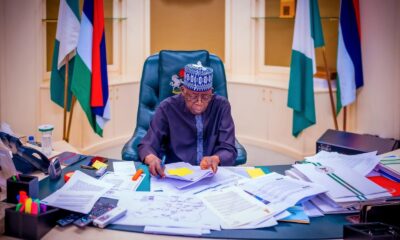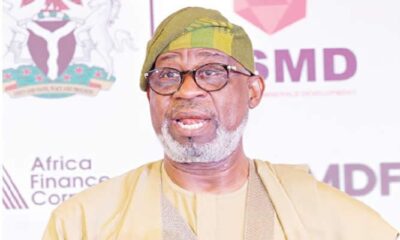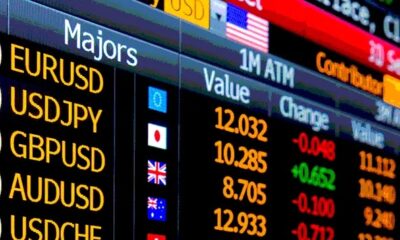The Presidency has given further insight into the reason for the sacking and replacement of service chiefs in the country.
While denying that the military shake-up was connected to a rumored coup plot, the Presidency said it was a move to “inject new direction” into the armed forces.
The Special Adviser to the President on Information and Strategy, Bayo Onanuga, told Saturday PUNCH that Tinubu acted within his authority to make leadership changes in the military.
“Service chiefs can be hired and fired by the President. He is the Commander-in-Chief. He has the power to hire and fire,” Onanuga said.
Earlier on Friday, the President had announced sweeping changes in the military hierarchy.
A statement by the Special Adviser to the President on Media and Public Communication, Sunday Dare, named General Olufemi Oluyede as the new Chief of Defence Staff, replacing General Christopher Musa.
It added, “The new Chief of Army Staff is Major-General W. Shaibu; Air Vice Marshall S.K. Aneke is Chief of Air Staff; while Rear Admiral I. Abbas is the new Chief of Naval Staff. Chief of Defence Intelligence, Major-General E.A.P. Undiendeye, retains his position.”
Tinubu charged the new service chiefs to justify the confidence reposed in them by enhancing the professionalism, vigilance, and comradeship that define Nigeria’s Armed Forces.
The appointments, Dare said, took immediate effect.
The development came barely a week after an online media platform, Sahara Reporters, published a story alleging that some military officers plotted to remove President Tinubu.
The report, which went viral on October 19, linked the detention of 16 military officers to the purported coup and claimed that the cancellation of the Independence Day military parade was part of efforts to suppress internal unrest in the military.
However, the Defence Headquarters denied the story.
In a statement signed by the Director of Defence Information, Brig. Gen. Tukur Gusau, the military dismissed the report as “false and intended to cause unnecessary tension and distrust among the populace.”
Gusau said the cancellation of the Independence Day parade was “purely administrative” and that the detained officers were being investigated for “issues of indiscipline.”
He maintained that the armed forces remained loyal to the Constitution and to the President.
Still, the timing of the service chiefs’ removal — barely days after the coup report — has continued to fuel public suspicion.
Why Tinubu sacked service chiefs — Presidency
Reacting to the speculation, the Senior Special Assistant to the President on Media and Publicity, Tope Ajayi, explained that the move followed two years of sustained operations under the previous chiefs.
He noted that the move reflected the President’s desire “to inject new direction, vision, vigour and energy” into the military.
“This is not a reaction to any rumour of coups. He is exercising his powers. The service chiefs have done two years,” Ajayi told Saturday PUNCH.
“We are fighting security issues — Boko Haram in the North-East, banditry in the North-West, IPOB and ESN in the South-East, kidnapping in the South-West, and other crises in the North-Central,” he added.
Ajayi emphasised that the President’s action was lawful.
He further noted that the country’s heavy security spending in recent years had drained funds from other key sectors.
“In the last 15 years, look at our national budget — security taking the largest chunk. The President wants to deal with this matter once and for all, so that the money going into defence expenditure will be better deployed to fund critical infrastructure like power, roads, broadband, education, and healthcare,” he said.
Ajayi added that the President’s decision was consistent with the constitutional provision that all appointees serve at the President’s pleasure.
“Every appointee of government, whether you are minister, head of agency, or service chief, serves at the pleasure of the President. Nobody has a secure tenure. The only two people in the Federal Government who have a guarantee of tenure are the President and the Vice President,” he explained.
Public suspicion persists
Despite the explanations, speculations linking the shake-up to the rumoured alleged coup plot have continued to grow.
A senior security operative in one of the intelligence agencies told Saturday PUNCH that people connecting the change of service chiefs to the rumored coup attempt “have a point.”
“Information about the matter is not something you can easily get. The official statement of the military is that there was nothing like a coup attempt, and we stay with that.
“However, those trying to connect the removal of the service chiefs to the denied coup plot also have a point. People will definitely add two and two together and form their opinions,” he said.
On X, Nigerians also drew connections between the timing of the announcement and the reports of arrests within the military.
Ikechukwu Ude said, “There were rumours of a military coup last week, and today some of the military service chiefs were sacked. That the rumour was debunked, but it seems to be true right now from the sack of service chiefs! No civilian with zero capacity can stop military generals if they intend to change any government.”
Another Nigerian, Muduwa Kerra, said the removal of the service chiefs signified how close the country was to a coup.
Similarly, Abraham Uyanna queried, “If there wasn’t an attempted coup, why is there a sudden change of service chiefs?”
ADC demands answers
Meanwhile, the African Democratic Congress has urged President Tinubu to explain the replacement of the nation’s military leadership.
In a statement issued on Friday by its National Publicity Secretary, Bolaji Abdullahi, the party said, “We note that nearly all the service chiefs that have been removed were appointed only 28 months ago, with the current Chief of Defence Staff himself appointed just a year ago as Chief of Army Staff.
“We also note that this kind of decision has serious and far-reaching implications for stability within the ranks and therefore could not have been taken without strong reasons. Our position remains, therefore, that the Federal Government owes Nigerians a categorical explanation about what truly happened.
“As an opposition political party, our interest remains the stability of our country and our democracy. In the light of developments in our neighbourhood of Chad and the Sahel States, we are gravely concerned.”
The ADC observed that the near-total overhaul of the nation’s military leadership was more likely to fuel rumours and conspiracy theories rather than dispel them.
Mixed reactions trail appointments
Also, security experts expressed mixed reactions to the changes.
A former Director of Legal Services at the Nigerian Army, Col. Yomi Dare (retd), described the appointment of the new service chiefs as a morale booster.
He said, “There is no security implication other than that the outgone officers have done their bit. The new service chiefs, by virtue of their appointment, must now be motivated to work effectively. They should assess what their predecessors achieved and, in unspoken words, learn from what they did and failed to do.”
Similarly, a former Director of the Department of State Services, Mike Ejiofor, noted that while the President had the constitutional power to make such changes, the real challenge remained funding and operational conditions.
“For me, changing the service chiefs might not necessarily change anything because they have all been working under very difficult situations,” he said.
“We should also not forget that they are operating under serious financial constraints. People say this year’s budget is the highest in terms of defence, but has it been implemented? The funds have not been released, so they are working in a very tough environment.”
Ejiofor urged the Federal Government to prioritise the release of funds and strengthen coordination among the agencies.
“A foundation has already been laid by the former service chiefs, so the new ones should consolidate on the gains made by their predecessors,” he advised.
On his part, security analyst Akogun-Abudu Oluwamayowa faulted the timing and necessity of the overhaul.
“What is happening in this country in terms of insecurity is not about changing the service chiefs. One of the problems we are facing is that we do not have perimeter fencing. People from other countries come into our country without barriers, wreaking havoc. The change may not be effective when major issues are not tackled,” he said.
He urged the new chiefs to prioritise the welfare of soldiers.
“The best welfare for soldiers is not training but their well-being. Their salaries are not even enough. These people are really suffering. I advise that these new service chiefs fight for the soldiers and pay attention to their welfare,” he said.








































